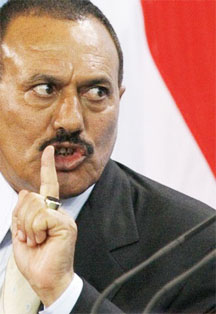SANAA/CAIRO, (Reuters) – Protests erupted across much of the Arab world yesterday, the Muslim day of prayer, with demonstrators killed in Syria and Yemen while Egyptians staged one of the biggest rallies since President Hosni Mubarak’s fall.
In Syria, 22 people were killed, sources in the southern Syrian city of Deraa said, and four people were shot dead in Yemen. In Saudi Arabia Shi’ites protested in the oil-producing east to call for the withdrawal of Saudi troops from Bahrain.
In Cairo’s Tahrir Square, perhaps the spiritual home of the Arab protest movement, crowds demanded Mubarak’s prosecution as discontent with military rule grows; but in Oman heavy security prevented a planned demonstration after Friday prayers.

Friday has become a peak day of protest for many Arabs since popular demands for freedom, democracy and an end to corruption began in Tunisia late last year and spread across the region.
In Syria, security forces opened fire on thousands of demonstrators in the southern city of Deraa as protests against President Bashar al-Assad flared in several towns.
Residents in Deraa, where demonstrations first broke out in March, said security forces fired on thousands of protesters.
A volunteer at Deraa hospital and an activist said 22 people were killed and 120 wounded. It took the death toll in three weeks of protests to more than 90.
“There were snipers on roofs. Gunfire was heavy. The injured are being taken to homes. No one trusts putting his relative in a hospital in these circumstances,” said a witness, who spoke to Reuters by telephone.
Authorities have blamed armed groups for the violence, and state television broadcast footage of masked gunmen in plain clothes it said fired at security forces and civilians alike. It said a policeman and an ambulance driver were killed.
Syria has prevented other media reporting from Deraa.
In eastern Syria, ethnic Kurds demonstrated for reform despite Assad’s offer this week to ease rules which bar many of them from obtaining citizenship, activists said.
Violence also broke out in Yemen as crowds demanded the overthrow of President Ali Abdullah Saleh. Two people were shot dead and 25 wounded by gunfire in the southern city of Taiz, hospital sources said.
The Defence Ministry said forces commanded by renegade General Ali Mohsen killed two pro-Saleh demonstrators in the capital, Sanaa. Mohsen’s forces were not immediately available for comment.
Saleh rejected any aspect of a Gulf Arab mediation plan for talks with the opposition that would aim to end his 32-year rule. “The Yemeni people are free to accept mediation from their brothers and friends, but they reject taking orders or intervention,” Saleh said in a statement.
Elsewhere, the day of protest was more peaceful.
Tens of thousands of Egyptians in Tahrir Square demanded Mubarak’s prosecution and accused the military of being too slow to root out corruption from his era.
“Oh, Field Marshal, we’ve been very patient!” chanted some of the demonstrators in the square, hub of the movement that toppled Mubarak on Feb. 11 and left the army in charge, led by Field Marshal Mohamed Hussein Tantawi.
Friday’s protest had swollen by early afternoon to at least 100,000, indicating growing frustration with the army which has enjoyed broad support since it took control of the country.
“It’s a strong message that the revolution is not over yet and is still going on and will not quieten down before its goals are realised,” said Hassan Nafaa, a professor of political science and a prominent figure in the reform movement.
Hundreds of Saudi Shi’ites also peacefully demanded that Saudi troops return from Bahrain, and called for political rights and freedoms at home, demonstrators said.
The protests — with riot police nowhere to be seen — were held in the main Shi’ite Muslim centre of Qatif, where demonstrators, some of them women, waved Bahraini as well as Saudi flags, and the nearby village of Awamiya.




